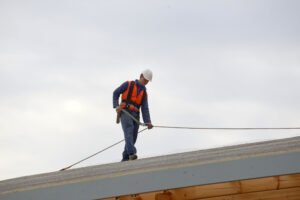by Connor | Feb 14, 2022 | Roofing

Any roofing project requires planning, even more so larger commercial projects. Without planning, the likelihood of being successful is slim and your precious investments will be at high risk.
The roofing project must begin by verifying the available funds and collecting information and specifications about the roof. Project development comes next, with identifying the stakeholders in the project, planning site access, protection, and communication.
There will also be some other pre-construction activities that may include sending documents, setting up subcontractors etc., and then the actual work can start.
In order to prevent mistakes, delays, the use of incorrect materials, and compromised quality, a large commercial roofing project must be supervised closely by a knowledgeable Atlanta commercial roofing contractor during each stage. This way, problems can be identified in time to carry out preventive and corrective measures.
As a commercial building owner or administrator, you must realize that your communication with the roofing contractor throughout the project is essential. Therefore, you must be able to establish contact whenever you have queries or concerns. You are fully entitled to expect your contractor to be available, and be able to prove that the work is going according to the contract you signed.
by Connor | Feb 7, 2022 | Commercial Roofing
Inspecting commercial roofing in Atlanta can be quite difficult. That’s because, unlike residential roofing, commercial roofing can cover quite a big surface. Also, the materials used in commercial roofing differ from those used for residential purposes. That’s why a preferred commercial roofer Atlanta area professional uses drones that have special thermal vision cameras attached to them when doing these inspections.

When performing an inspection on a roof, the most important thing to look out for is heat build-up in certain areas of the roof. That means either the heat is escaping from the inside, leading to severe structural damage. Or, that can mean the heat is getting in, which can, in turn, mean the roofing system is faulty somewhere and in need of repairs.
Also, using a drone with thermal scanners to inspect commercial roofing in Atlanta can give both owners and contractors a much clearer idea about what material they need to use for their roofs. For instance, the materials used for the roof of a wood processing plant may not be the right material to use for an industrial car parts manufacturer.
by Connor | Jan 28, 2022 | Commercial Roofing

When thinking about what kind of materials to buy for your roofing project, you should really consider rubber roofing materials. There are several advantages to using these products, and the biggest one might be the easy installation. Rubber shingles, for instance, are much easier to install than regular ones. That’s because the shingles are much lighter and more flexible, so they don’t need to be handled with as much care. They can take a lot of stress when being handled and installed. Also, rubber shingles fit easily in almost any space. That’s because you can carve them any way you like with a simple utility knife.
According to a recommended commercial roofer Atlanta area professional at https://superiorcommercialroofing.com/, another great thing about rubber roofing materials is that they are extremely low-maintenance. If you don’t want to waste time with roof inspections or don’t have the money for costly repairs every season, these materials are what you are looking for. Since they are made out of tough rubber, they can go a long time without you having to take special care of them. All you have to do is install the rubber shingles and maybe give them a coat of paint now and again for aesthetic reasons.
by Connor | Jan 20, 2022 | Commercial Roofing
The first thing everyone should know about TPO roofing is that it is straightforward to install. This roofing system consists of a reinforced membrane that attaches to the roof using a special adhesive. The membrane comes in different thicknesses so that you can choose the right thickness for your specific needs. 
For instance, if you live somewhere with heavy rainfall, you will want a roofing system that efficiently keeps the water out of your building So naturally, you will choose a thicker membrane of TPO. Accomplished TPO roofing Atlanta companies assert that the thickness of the membrane influences the quantity of heat that escapes through the roof. So, the thicker the membrane, the less heat is left out, so you’ll enjoy a comfortable temperature inside the building during cold seasons, while also saving on heating bills.
Another thing people should know about TPO roofing is the membrane itself can be used several times. The membrane is made from eco-friendly materials and can be recycled and reworked into new membranes. That means you don’t have to throw away the old TPO membrane when you decide to replace it. You need to contact your local recycling center and ask them if they take in such materials. This way, you can also keep the environment a little cleaner.
by Connor | Jan 14, 2022 | Commercial Roofing
Inspecting your roof regularly can help you keep it in tip-top shape. That means you will not have to invest in repairs as often and as much as you would have otherwise. But inspecting roofs can be quite dangerous and time-consuming, especially if we’re talking about really tall buildings with large roof areas. This is where modern technology comes into play. For some, drone thermal roof inspection may sound like something out of a sci-fi movie, but professionals use it nowadays to make their jobs easier and safe, as well as to get more accurate results.

A high quality drone thermal roof inspection utilizes a flying a drone equipped with a heat sensitive camera. That way, the crew on the ground maneuvering the drone can see where the hot points of a roof are in real-time. With this approach, it is easier for them to map out large roof surfaces and know where to make repairs. Also, it is easier this way to collect data about certain types of roofing. This data can also help roofers, and builders in general, know how to choose better materials for similar jobs they might have in the future.





